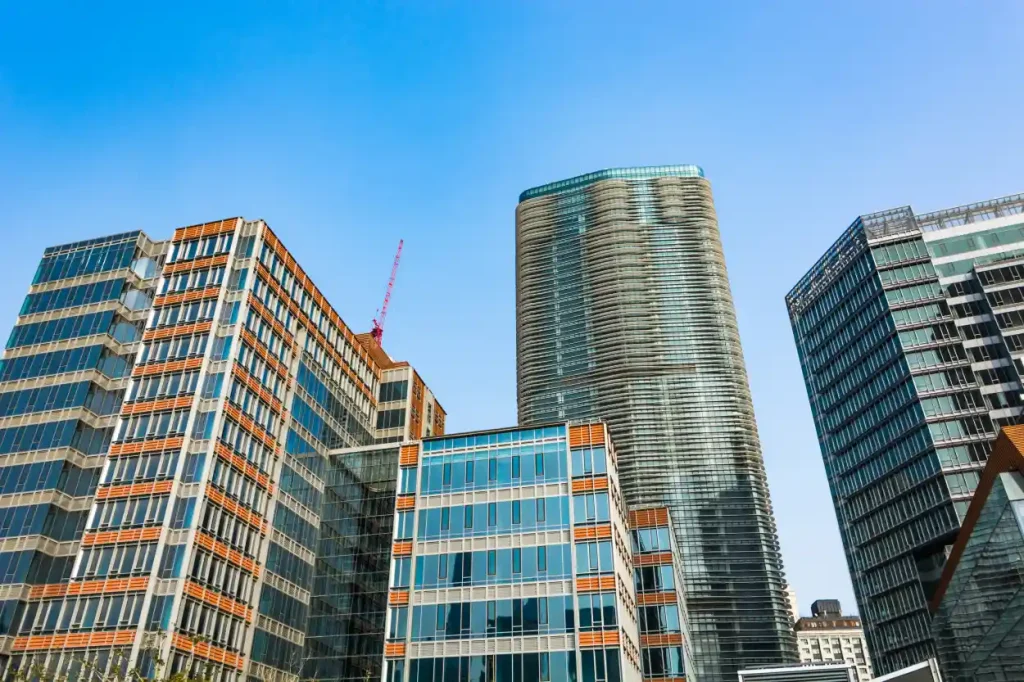
Have you ever wondered, “What is commercial real estate?” It’s more than just towering office buildings and bustling shopping malls. Commercial real estate (CRE) encompasses a diverse range of properties used for business and income generation, from industrial warehouses to cozy multi family homes.
Unlike residential real estate, where people live, CRE focuses on spaces where businesses thrive and investors see potential for financial growth. If you’re curious about the different types of CRE, how it’s valued, and whether it’s a good investment for you, keep reading! We’ll uncover the ins and outs of this fascinating world, exploring its various types, investment potential, and even how to get started.
So, What Is Commercial Real Estate?
Commercial real estate is property used for business purposes or income generation rather than residential living. It encompasses a wide span of property types, including office buildings, retail spaces, industrial warehouses, multifamily apartment complexes, and hotels. CRE investments often involve larger capital outlays and longer lease terms than residential real estate, but they present the potential for higher returns through rental income and property value appreciation.
Different Types of Commercial Real Estate
There are different commercial real estate properties, each serving unique purposes and catering to specific business needs. Understanding these types can help investors make informed decisions and maximize their returns. Here are the main categories:
- Office Buildings
Office buildings accommodate businesses and organizations requiring professional spaces. They range from urban skyscrapers to suburban office parks. Classified into Class A, B, and C, with Class A offering top-notch construction, location, and amenities. These buildings attract high-profile tenants and offer services like advanced infrastructure and high-end finishes.
- Retail Spaces
Retail spaces include shopping malls, strip centers, and individual storefronts. They cater to businesses selling goods and services directly to consumers. Location, visibility, and foot traffic are crucial for success. Tenants vary from large anchor stores to small boutiques, focusing on enhancing the shopping experience.
- Industrial Properties
Industrial properties are utilized for manufacturing, storage, and distribution. Examples include warehouses and factories. Located near transportation hubs for efficient goods movement, these properties are vital for logistics and e-commerce growth. Features like high ceilings and wide floor plans are common.
- Multifamily Housing
Multifamily housing comprises apartment complexes, duplexes, and townhomes. Designed for multiple families or individuals, these properties offer steady rental income and lower vacancy risks. Amenities like pools and communal areas enhance appeal, with location and tenant demographics being key factors.
- Hospitality Properties
Hospitality properties include hotels, motels, and resorts, providing lodging and accommodation. Catering to tourists and business travelers, they depend on economic conditions and travel trends. Successful properties offer comfort and convenience, with amenities like restaurants and conference rooms.
- Mixed-Use Developments
Mixed-use developments combine residential, commercial, and sometimes industrial spaces in one area. These properties create vibrant communities where people can live, work, and shop. They are designed to enhance convenience and reduce the need for long commutes, fostering a dynamic environment.
- Special Purpose Properties
Special purpose properties are created for specific uses, such as schools, churches, and self-storage facilities. These properties are built to meet unique requirements and often have specialized layouts and features. Their value is tied to the specific needs they serve, making them unique investment opportunities.
- Land
Land is a versatile type of commercial real estate, ranging from undeveloped plots to developed parcels ready for construction. Investors can purchase commercial land for sale for various pursuits, such as agriculture, residential development, or commercial projects. Land investment requires careful consideration of location, zoning laws, and potential for future growth, offering significant long-term returns.
<h2>Is It Better to Invest in Commercial Real Estate Than Residential Real Estate?
Both commercial and residential real estate offer unique advantages. Commercial real estate often yields higher returns and longer leases, while residential real estate usually requires a lower initial investment and is easier to finance. The “better” investment relies on your financial goals, risk tolerance, and market knowledge.
Commercial real estate might be ideal for investors seeking higher income and longer-term stability, while residential real estate could be more suitable for those starting with less capital or preferring shorter lease terms. Thoroughly researching the market and understanding your investment objectives is crucial before deciding.
FAQs

What are the main benefits of investing in commercial real estate?
Investing in commercial real estate presents several benefits, including higher potential returns, longer lease terms, and professional tenant relationships. Commercial properties often generate higher rental income and can appreciate significantly in value over time. Additionally, leases are typically longer, providing more stability and predictability for investors.
How is the value of commercial real estate determined?
The worth of commercial real estate is primarily determined by factors such as location, income potential, property condition, and market demand. Appraisers often use methods like the income approach, which considers the property’s potential to generate income, and the sales comparison approach, which looks at recent sales of similar properties in the area.
What financing choices are available for commercial real estate investments?
Financing choices for commercial real estate include traditional bank loans, commercial mortgage-backed securities (CMBS), private equity, and crowdfunding platforms. Each option has different terms, interest rates, and qualification requirements, making it important for investors to choose the one that best suits their financial situation and investment goals.
What are the risks associated with commercial real estate investment?
Risks in commercial real estate investment include market volatility, economic downturns, property vacancies, and maintenance costs. Market conditions can influence property values and rental income, while vacancies and tenant turnover can impact cash flow. Proper due diligence, market research, and risk management strategies can help mitigate these risks.
Conclusion
Understanding “what is commercial real estate” is the first step to unlocking its potential for high returns and long-term stability. However, it’s crucial to weigh these benefits against the risks involved in this type of investment. Thorough research and due diligence are key to making informed decisions in the CRE market.
Ready to explore the possibilities of commercial real estate investment? Contact us at 3D Real Estate today, a commercial real estate broker in Colorado, and let our experts assist you in locating the perfect property to match your financial goals and risk tolerance.




